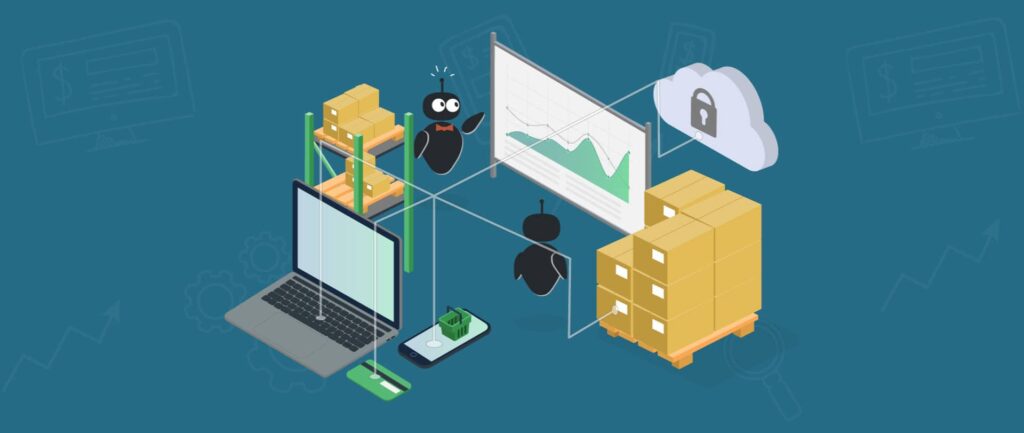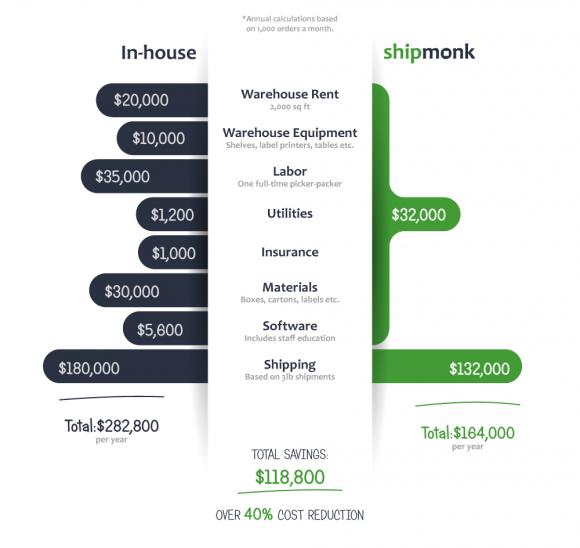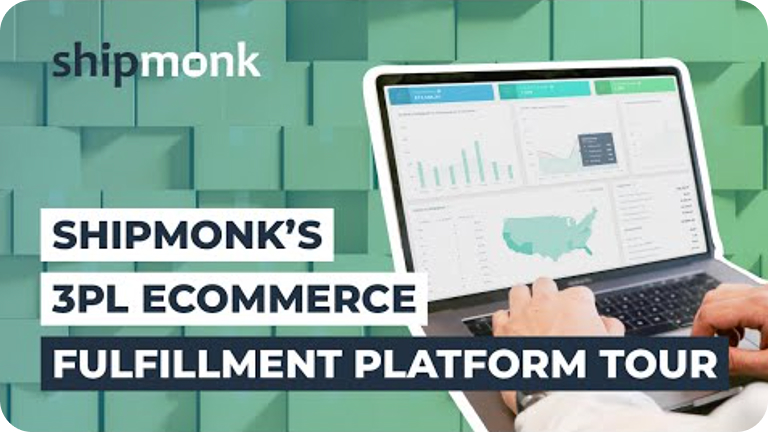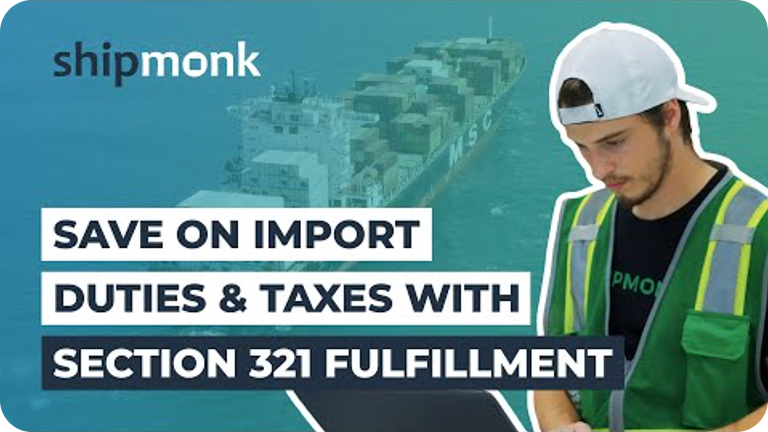Most business owners love the process of creating products. Many business owners even enjoy marketing and selling their products. But, if you ask business owners whether they actually like the process of warehousing, shipping, and fulfillment, we think you’ll hear a resounding “no.”
Small businesses often start by warehousing and fulfilling their own products, setting up shop in their own home, office, or garage. However, if you have a goal of scaling your business, packing and shipping orders yourself may not be an option for long.
If your business is already shipping a large volume of orders, then you’re well aware of the obstacles and the amount of resources dedicated to storing and shipping products. Managing warehouse operations demands a reliable team, efficient processes and systems, and strategically-positioned warehouse real estate in order to keep fulfillment costs down (and profits high).
You may be thinking that your business, your products, or your packaging are too different or unique to outsource your fulfillment process. How could the quality of your team’s work ever be properly duplicated without a dedicated in-house fulfillment team? Easy. Find a great fulfillment warehouse that is as dedicated to your success as you are.
If you want to be able to scale your business, outsourcing resource-heavy processes will allow you to dedicate more of your precious resources to the areas your company wants to focus on, such as product development, sales, marketing, or customer service.
When searching for a fulfillment warehouse, lead with knowledge. Read on to learn the answers to all of your questions about warehousing and fulfillment.
What is a fulfillment warehouse?
A fulfillment warehouse is a type of Third-Party Logistics (3PL) provider which “receives, holds, and transports a conumer product in the ordinary course of business but who does not take title to the product.”
Essentially, a fulfillment warehouse stores your inventory and ships orders to your customers. However, many fulfillment warehouses offer additional services (such as exchanges and returns management) to ensure that your business can receive the maximum benefit possible by outsourcing your warehousing and fulfillment processes.
And even though the fulfillment warehouse does not hold legal ownership of your stored inventory, they are contractually responsible for performing the specified fulfillment activities.
What types of businesses should NOT hire a fulfillment warehouse?
Third-party logistics might not be an option for a brand new business in an unvalidated market.
If your business has no cash and is struggling to bring in orders, fulfillment logistics may not be the right area to focus on today. Many founders bootstrap their business in the beginning and leverage their time instead of money.
If your products are hand-made or customized per order, outsourcing to a fulfillment warehouse probably doesn’t make sense for your products.
What are the benefits of outsourcing shipping to a fulfillment warehouse?
There are many benefits of outsourcing order fulfillment, such as:
Increased flexibility and ability to scale
Finding the right fulfillment warehouse for your business is key to growth and flexibility. Renting your own warehouse often locks your business into long leases with fixed terms – a commitment which can be a prohibitive cost for small businesses.
That’s why many third-party warehousing and fulfillment companies offer flexible plans and pricing to accommodate your company’s unique sales cycles.
As your business grows or pivots, sales increase, and new products are added, your fulfillment logistics company should adapt according to your needs.
Alternatively, if your business has slow seasons with low inventory levels, you should be able to decrease your warehousing costs. With short-term (even month-to-month) commitments, your business can stay flexible and lean.
Outsourcing the need for physical storage space can even allow your company to create a remote team, if travel and location-independence is important to you.
No warehouse to manage
Obviously, if you outsource your product storage and shipping process to a third-party fulfillment warehouse, you don’t have to manage any of the demands (or overhead costs) of a physical warehouse. No products to receive, stock, count, pick, pack, and ship.
That also means no staff to hire, train, manage, and payroll. You’ll never have to spend time and money hiring, training, or managing new warehouse employees for peak season, only to let them go after season ends.
Improved efficiency and service
Letting warehousing and fulfillment experts handle your order fulfillment logistics means you’ll benefit from their dedication, expertise, efficiency, and best practices. When your company becomes a client of a top-level fulfillment warehouse, your business instantly gains a competitive advantage.
Fulfillment warehouses live and breathe logistics. They are dedicated to optimizing fulfillment, warehousing, and shipping. This translates into a faster and more reliable fulfillment process, which equals happier customers. And happier customers are more likely to make repeat purchases (and word-of-mouth recommendations).
International shipping becomes easy.
The logistics of international shipping can cause a bottleneck in your operations, especially if orders are fulfilled incorrectly. The documentation required, customs, taxes, and other potential obstacles can clog up in-house operations, delay shipments, and result in higher costs when not completed properly. Working with a 3PL fulfillment warehouse can help to ensure successful delivery and speedy transit.
Save money
Fulfillment warehouses leverage their combined shipping volume from all of the vendors they ship for. This lowers their overall shipping rates, so your business will benefit from lower shipping costs. They often have access to a wider range of shipping options, which can also help save on fulfillment costs.
You can also save on warehouse rent and equipment, labor, utilities, insurance, materials, and inventory management. Read this article to learn more about cost savings by using a fulfillment company.
Here’s a graph we’ve developed to better illustrate the cost of fulfilling orders in-house vs. outsourcing to an order fulfillment company:
Focus your resources on growing your business
Outsourcing resource-heavy processes such as warehousing and fulfillment will allow you to dedicate more of your time, money, and human resources to the areas your company wants to focus on – such as projects that will bring in more sales and cash flow to your business.
What are the disadvantages of utilizing a fulfillment warehouse?
Customer experience still falls on you
When a customer doesn’t receive their order on time or receives the wrong product, they’ll be looking to your company to fix it. Your 3PL warehousing partner’s reliability will directly affect your brand’s reputation, so make sure to properly vet potential fulfillment companies.
Transitioning and set-up fees
Most fulfillment warehouses will require upfront costs for integrating software and systems with your business, uploading inventory data, and setting up your account. While this can make outsourcing seem costly at first, these fees are usually only charged once.
Lack of inventory on-hand
Having your products stored in a 3PL fulfillment warehouse means you won’t have inventory accessible on-hand. You may end up working with a warehouse located far away from your day-to-day business operations. However, you can put processes in place to ensure quality control – or to receive a small amount of inventory, if it’s important for you to have products in-house for training staff or showrooms.
When should I hire a fulfillment warehouse?
While most startups fulfill orders in-house in the beginning, utilizing a fulfillment warehouse can be key to scaling your business. The reason more sellers use third-party logistics (3PL) partners is that it simply makes good business sense to let experts handle the process.
Here are some indicators that it’s the right time to outsource your warehousing and fulfillment:
Seasonal sales cycles
If your sales volume fluctuates significantly with the seasons, a fulfillment warehouse will help your business stay flexible and lean by adjusting monthly service costs to the level your business needs at the time.
Not enough time or human resources
If your team is getting backed up with other priorities, reclaim your time by outsourcing processes that demand too much of your resources for too little return. Maximize your ROI by focusing on what your company does best and letting fulfillment experts handle your warehousing and shipping.
Not enough space
Businesses come in all shapes, sizes, and types. If your business is bootstrapping and your home, office, or warehouse is running out of storage, then outsourcing your warehousing can streamline your operations.
No efficient systems and processes in place
Sometimes companies grow quickly, nullifying old processes and systems. Upgrade your business efficiency by outsourcing fulfillment to a dedicated logistics company. They have the knowledge, software, and human resources needed to deliver a high volume of orders correctly while remaining lean and agile.
Too many sales to fulfill
First of all, congratulations! This is every business owner’s favorite problem to have. Perhaps your founders were featured on Shark Tank, your marketing campaign went viral, or your brand has hit a stride in your niche. This is your time to shine! But if you don’t deliver on your promises and keep up with consumer demand, your brand can be hurt by negative reviews and disappointed customers.
If you can’t keep up with the influx of orders your company receives now – and you don’t have time to hire, train, and manage new team members – then it’s a great time to outsource your shipping and fulfillment to a third-party logistics provider (3PL).
Similarly, if you are expecting to be featured in prime-time media (or have a massive sales promotion) and anticipate a flood of new orders, you’ll need to be prepared with an efficient fulfillment process in place. We recommend that you start working with a fulfillment warehouse at least 3-4 months in advance.
In hard numbers: If you are fulfilling more than 10 orders per day, you should start considering outsourcing to a third-party fulfillment warehouse.
If your profit margins are high enough to allow for outsourcing costs, a great warehouse 3PL can become a strategic partner for business growth.
What is the process like when using a fulfillment warehouse?
Once your company begins outsourcing fulfillment logistics, your business and team can become far more agile.
Systems will be integrated so that every order received by your business is automatically sent to the fulfillment warehouse. Your 3PL warehouse will know what to ship and who to ship it to, and inventory levels will automatically update.
For most businesses, the order fulfillment process looks something like this:
- Company receives an order through their online shopping cart or marketplace.
- Customer is notified the order has been received and is being processed.
- Order goes to warehouse via order management software.
- Order is picked, packed, and prepared for shipping.
- Order is shipped.
- Customer is notified that the order has shipped.
- Order arrives at the customer’s preferred location.
The number of steps involved requires your business to develop an efficient order fulfillment process. Poor order fulfillment practices can lead to damaged products, returned orders, and generally unhappy customers.
Streamlining and automating every step after the order is received means your customers receives their orders more quickly.
As always, your buyer or Director of Purchasing must be dedicated to ensuring that your fulfillment warehouse is stocked with proper levels of inventory. And your sales and marketing teams can confidently promote products with peace of mind that orders will be shipped promptly.
What costs are associated with 3PL fulfillment?
Costs and fees can include:
- Account setup and shopping cart integrations
- Transportation
- Receiving
- Warehousing and storage fees
- Insurance
- Picking and packing
- Shipping and international fulfillment
- Customer support
- Special requests (e.g. gift wrapping, marketing inserts, special packaging, custom packing procedures)
- Inventory management software
- Returns management
- Order minimums
- Kitting and assembling
- Document filing
- Counting inventory
How are customer returns and refunds handled?
This can vary among third-party logistics providers, but many companies offer support for customer returns, exchanges, and refunds. In this case, the fulfillment warehouse would receive and inspect the item for damage, and can return it to inventory if desired.
What if my brand uses custom packaging?
Many (but not all) fulfillment warehouses understand that a memorable unboxing experience helps to solidify your brand in a customer’s mind and increases social recommendations.
If this is important for your brand (or if this is a goal for the future), choose a fulfillment warehouse that will accommodate branded packaging and specific boxing instructions. They may even be able to guide you through best practices when designing your brand’s custom packaging and planning the consumer’s unboxing experience.
How do I choose the right logistics company?
It’s important to choose a reputable company that integrates well with your brand’s goals. If possible, ask for recommendations from business owners you trust. Even so, recommendations shouldn’t be the only deciding factor in choosing a fulfillment partner.
Look beyond the price
While it is important to keep your costs as low as possible, a great fulfillment warehouse offers value far beyond its price.
High-quality, reputable fulfillment companies will save you time and money by creating happier customers with reliable service.
Prioritize specialization
When choosing between fulfillment warehouse and logistics companies, you can receive additional value by partnering with a company fulfillment that works with businesses similar to yours – perhaps in your industry, niche, or a company type with similar needs (such as kitting or fragile inventory). Ecommerce companies can benefit from working with a warehousing and fulfillment center that understands the nuances and trends of ecommerce fulfillment.
Do your products require temperature control, a secure facility, or a dust-free environment? These types of specific questions can help narrow your search in the beginning, and save you time when vetting fulfillment partners.
The right logistics company becomes a strategic partner in your business growth.
Look for locations
Fulfillment companies with large warehouse networks may have more warehouse locations available to choose from. However, the more locations you want your products to be stored in, the more products you’ll need in your inventory.
Look for fulfillment warehouses that are strategically placed to serve the most of your customers.
If the majority of your customers are on the West Coast of the U.S., you may want to utilize a U.S. fulfillment center with a warehouse in California. This will help keep costs lower (and transit times faster) for the majority of orders, lowering your average shipping costs.
Ask a lot of questions
As a prospective customer, it is your right and duty to ask potential service providers your burning questions. When having conversations with fulfillment warehouse companies, don’t hesitate to ask as many questions as you need to in order to make an informed decision.
Find out about their service guarantees, and make sure that you understand how fees are calculated and how your account would be managed.
- What is the cost breakdown? What additional services are offered?
- What are their hours of operation? Are they open on weekends or holidays?
- What happens if they miss a shipping cut-off and an order is shipped out late?
- Will they offer a credit for broken or lost products?
- Does the building have security?
- Who do you contact when you have questions or concerns?
- How often are they available to answer your email and phone calls?
- Do they have an enforceable non-disclosure agreement (NDA)?
- Does the fulfillment company have a track record of stability?
- Can they share reports that detail their key performance indicators, such as on-time deliveries?
- Are their systems compatible with your inventory management system?
- What is their maximum daily shipping capacity?
- What is their maximum inventory storage capacity available to you?
- How would they handle a sudden increase in orders?
- How many warehouses do they operate in their network?
- Are their warehouses located in areas you ship a high volume of orders to?
- Have they worked with companies in your industry?
- Do they inform you when inventory levels are low?
- What happens if you decide to cancel your contract in the future?
You’ll want to choose a fulfillment provider, that can handle your current shipping volume while still being able to adapt to an increase in stock or orders.
If you already have pre-negotiated carrier rates that are lower than a warehouse gets, make sure the warehouse can accept your shipping rates.
Speak with potential warehousing candidates
You can email at first, but eventually you’ll need to pick up a phone and speak with a live human. Engage potential fulfillment providers in a conversation about your business and your specific needs.
Ask for references. Make sure the fulfillment provider feels like a good fit for your business.
Follow up on references
Make the right decision the first time by ensuring you check references and claims of the fulfillment warehouse companies you consider hiring. Spending time verifying these details now can save you from future headaches.
Visit the warehouse
Before making your decision, schedule a visit to the warehouse. Observing the environment and processes may give you a greater understanding (and appreciation) of the service they provide.
Next steps
Once you choose a 3PL fulfillment warehouse, start out by sending a small amount of inventory to the warehouse, then test to ensure all systems are communicating and delivering properly. Once everything is confirmed to be running smoothly, you can confidently send the rest of your inventory to the new warehouse.
Now, celebrate the fact that you never have to tape up a box again! Put your faith into your new shipping partner, and allow yourself to focus on the core areas that truly need the expertise and attention that only you can provide.
Questions?
Still have unanswered questions about warehousing and fulfillment? Your business is unique, and we’d love to provide you with guidance to make an informed decision about warehousing and fulfillment.
Email us your experiences, thoughts, or questions for a chance to be featured on our blog!






